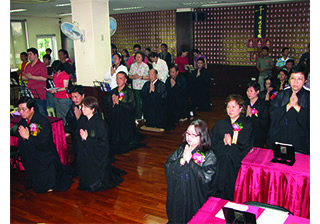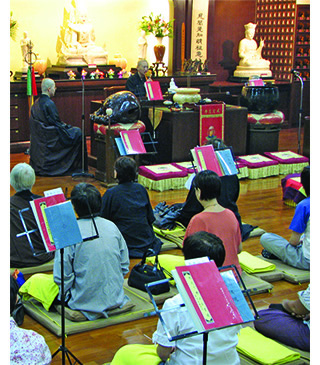Great Compassion Repentance
Ceremony
大悲懺法會
 Ocean Sky had two auspicious occasions to chant the magnificent Great Compassion Repentance Liturgy, in 2009 and 2010. The liturgy is connected to the great compassion of Bodhisattva Guan Yin. In the ceremony, the strength of compassion generated from the mindful and reverent chanting opens the hearts and minds of the participants to learn from Guan Yin, and to care for all sentient beings with unconditional compassion.
Ocean Sky had two auspicious occasions to chant the magnificent Great Compassion Repentance Liturgy, in 2009 and 2010. The liturgy is connected to the great compassion of Bodhisattva Guan Yin. In the ceremony, the strength of compassion generated from the mindful and reverent chanting opens the hearts and minds of the participants to learn from Guan Yin, and to care for all sentient beings with unconditional compassion.
The liturgy focuses on the power of the Great Compassion Mantra of Bodhisattva Guan Yin. With unwavering compassion, he manifests a thousand hands and eyes, as a skillful means to help the needy. The Bodhisattva vowed that if someone chanted this mantra sincerely, but was destined to fall into the three evil realms, and could not get rebirth in buddha lands, the Bodhisattva would not achieve Buddhahood.
After the ceremony, disciples in Ocean Sky realized with great Dharma joy that the true cultivation and real essence of the mantra as stated by Guan Yin is “to possess a mind of great compassion, equality, non-attachment, respect, and emptiness.”
Three Thousand Buddhas Jeweled Repentance Ceremony
三千佛洪名寶懺法會
 Ocean Sky adopted The Three Thousand Buddhas Jeweled Repentance Liturgy as its Saturday night repentance practice in 2008. That year, the whole monastery was mobilized to decorate the walls of the Chan Hall with one thousand pictures of Buddha. The magnificent outcome set the mood for the year-long ceremony.
Ocean Sky adopted The Three Thousand Buddhas Jeweled Repentance Liturgy as its Saturday night repentance practice in 2008. That year, the whole monastery was mobilized to decorate the walls of the Chan Hall with one thousand pictures of Buddha. The magnificent outcome set the mood for the year-long ceremony.
The liturgy pays homage to the 3,000 Buddhas of the three periods (eons). These three sets of one thousand Buddhas generally refer to the thousand Buddhas of the past period (莊嚴劫), the present period (賢劫), and the future period (星宿劫).
In one past life of Shakyamuni Buddha, he heard the names of 53 Buddhas, and was filled with Dharma joy. He went on to teach many men, until his teachings reached 3,000 people. These 3,000 men altogether praised and single-mindedly prostrated to the 53 Buddhas. With the auspicious merits, they were able to transcend samsara, and attained Buddhahood.
Buddhists in the Philippines usually recite this liturgy hoping to ward off calamity, pray for blessings and prosperity in the New Year.
